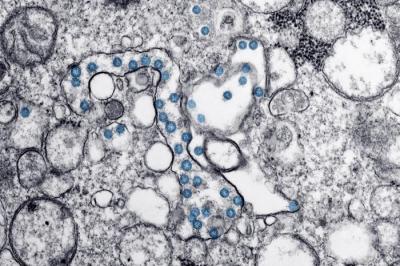Southcoast works to get more beds, educate public
As the number of people diagnosed with coronavirus continues to exponentially increase, Southcoast Health is working to dramatically increase the number of beds available at Tobey Hospital, buy more ventilators, and keep its front line staff healthy to best care for the patients soon to come.
“We currently have hundreds of beds available across the system,” said Southcoast Health Public Information Officer Shawn Badgley. “And a bed can become an ICU bed if need be with the use of a ventilator, for instance. It's also about ensuring we have good logistics in place to have the equipment on hand, to source more equipment, as we continue to do, and be sure that that equipment can be shifted from hospital to hospital if need be.”
Badgley said that Southcoast is currently working to open up additional space at Tobey Hospital that will allow for “scores of more beds, including critical care beds” in addition to the 42 of 68 beds at the hospital that are currently open there.
Southcoast is also actively buying new ventilators.
“We feel we’re in a good position at the moment, and we continue to improve that position,” Badgley said.
The hospital system is also working on a variety of contingency plans in case the number of patients needing help is beyond the capacity of the three hospitals in Wareham, New Bedford, and Fall River. One contingency plan Badgley said the system is ready to implement would be a system of tents outside hospitals which staff could use to evaluate patients, including symptomatic patients, in order to reduce the volume at emergency rooms.
Southcoast is also accepting donations of items including medical and industrial N95 masks, procedure masks, homemade masks, gloves, and hand sanitizer that is at least 60 percent alcohol. In the coming days, Southcoast will launch an online form for people to submit donations.
“Like many hospitals across the country and world, maintaining an inventory of personal protective equipment is a priority for us,” Badgley said. “We certainly have what we need in the moment, but projecting a month out or longer is something that we’re currently doing to protect our frontline staff.”
Southcoast is also focused on educating the public on the importance of staying home to limit opportunities to transmit or catch the virus.
“At this point, we’ve reached a level of community spread,” Badgley said. “Now, you have it being spread at a level that includes asymptomatic people. So you may look healthy, feel healthy, sound healthy, and still be transmitting the disease to people who are more susceptible.”
Taking steps like canceling professional sports seasons and not meeting up with friends in person are important ways to cut down on the virus’ spread.
“Both those things help flatten that curve of transmission and spread. If the virus is left unchecked and we were not to take measures to try and cut down transmission, that curve would be steeper and more devastating,” Badgley said. “So the more measures we can take to avoid unnecessary contact and potential spread, the more we can lessen the severity of that curve.”
The curve Badgley is talking about is the exponential growth in the number of coronavirus cases over time as seen on a graph. The goal is to flatten the curve so as to avoid completely overwhelming medical systems, as has happened in Italy.
“Please stay home if you can. We realize as much as anyone that doing so presents its own set of challenges: It’s not ideal for people’s mental health, it’s not ideal for the economy, it’s not ideal for social relationships, it’s tough for parents, but it’s one of the ways we can fight this virus, and it’s a weapon we have to use,” Badgley said.
Those who are experiencing symptoms of the virus, including shortness of breath, fever, or a dry cough, are encouraged to call their doctor and take advantage of telehealth.
Southcoast has also established a coronavirus hotline staffed by nurses who speak English, Spanish, and Portugese, at 508-973-1919.
“When individuals call, they will be able to get answers, be assessed, and get advice on next steps, whether that next step is to get an appointment and potentially a test if they fit the criteria or self-quarantine so they don’t put the public or themselves in danger,” Badgley said.
It’s very important for patients who might have the virus to call ahead before visiting a doctor, urgent care facility, or emergency room in order to give staff time to prepare and take precautions.
For more information and resources, go to southcoast.org.















